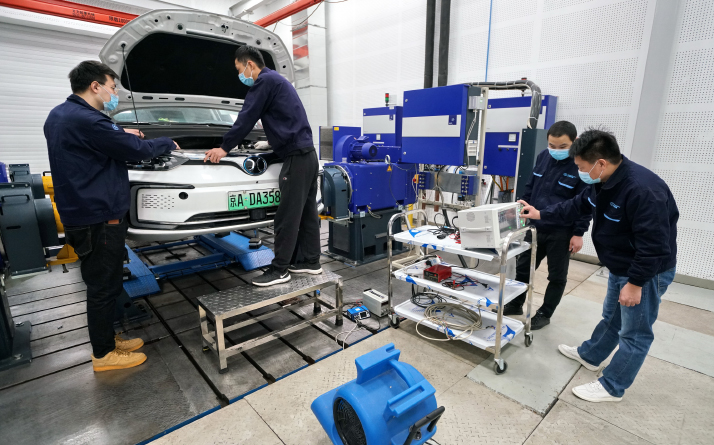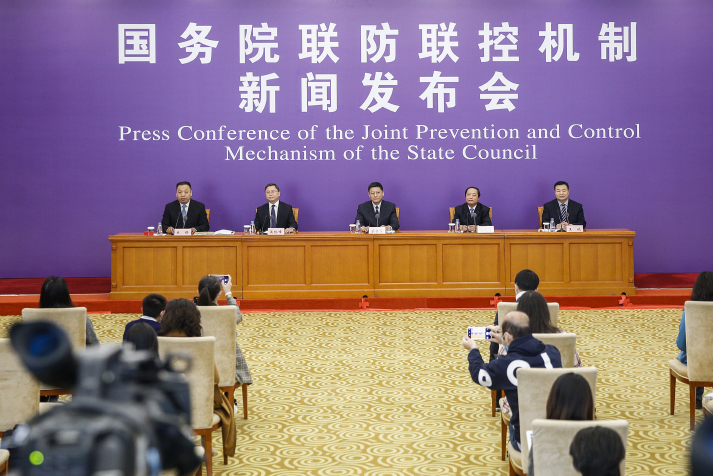| Business |
| New policies rolled out to rev up sales in pillar auto industry | |
|
|
 Technicians test a new-energy vehicle at a research and development center of BAIC Motor in Beijing on April 3 (XINHUA)
The local government of Shanxi Province in north China recently announced a new policy to stimulate car sales. From April 1 to December 31, for each purchase of passenger vehicles 7 meters long or bigger or trucks with a capacity of 4.5 tons and above, the buyer gets a reward of 8,000 yuan ($1,138). For each sports utility vehicle or multi-purpose vehicle, the amount is 6,000 yuan ($853), and for mini vans smaller than 3.5 meters or other commercial vehicles, 4,000 yuan ($569). With the novel coronavirus disease (COVID-19) outbreak affecting China's automobile production and sales earlier this year, governments at various levels are implementing measures to normalize the situation. Cai Ronghua, Deputy Director of the Department of Industry at the National Development and Reform Commission (NDRC), said at a press conference in Beijing on April 9 that the industry has resumed production effectively and is expected to recover soon. The NDRC, the Ministry of Commerce (MOFCOM) and the Ministry of Ecology and Environment have proposed policies to stabilize and expand automobile sales, Cai said. These measures relate to the new-energy vehicle (NEV) industry, accelerating rehaul of old cars and facilitating used car trade. "After the readjustments and improvements, the auto market will recover and remain stable for a long time to come," he said. Pillar industry The automobile industry is a pillar industry in China, which has a comparatively complete industrial chain with various closely connected industries. If production and sales in the industry decline, it will also affect other industries and eventually, the stability of the entire economy, Cai added. According to Wang Bin, head of the Department of Market Operation and Consumption Promotion at MOFCOM, in China, one in every 1,000 people owns a car, surpassing the world average. By the end of 2020, China will have a bigger car ownership figure than the United States. Also, China is the world's largest producer and consumer of automobiles and NEVs, as well as a key raw material producer and trader of auto parts. Its automobile output and sales volume have topped the world for 11 years in succession. In addition, 1.2 million NEVs were sold in China last year, accounting for more than 50 percent of the world's total. At least 21 provinces and cities have issued policies to boost car sales, from Beijing and Shanghai to industry-rich Guangdong Province in the south. Some local governments are offering subsidies or vouchers to buy new automobiles. Subsidies to boost sales In Sichuan Province in the southwest, for instance, the authorities have announced subsidies for rural residents. From April 10 to August 10, buyers will get a subsidy of 1,000 yuan ($142) for each locally made truck below 3.5 tons or passenger vehicle with engine displacement of less than 1.6 liters. The municipal government of Guangzhou, capital of Guangdong, is offering a subsidy of 10,000 yuan ($1,429) on the purchase of NEVs till December-end. "The policies rolled out by local governments to boost car sales are both timely and necessary, conducive to the economic recovery in the short term and in line with the trend of consumption upgrading and long-term economic growth," Ying Xiwen, a senior researcher with China Minsheng Banking Corp., told China News Service. Some cities have increased license plate quotas to stimulate car sales. Hangzhou, capital of Zhejiang Province in east China, said in March it will add 20,000 car plates to this year's new plate quota. Changchun, capital of Jilin Province in the northeast, has announced a one-off subsidy of up to 5,000 yuan ($711) for every licensed car owner in the province who sells or scraps their old car between March 20 and June 30, and purchases a new one produced in the city and registered in the province. In Foshan in Guangdong, the municipal government is providing a subsidy of 3,000 yuan ($427) to every Foshan car plate holder who buys a new car after selling or scrapping the old one. However, Ying also said most of these policies will only temporarily increase car sales. To support the industry in the long term, comprehensive policies are needed, such as upgrading infrastructure and developing a diversified automobile culture. According to Su Jian, head of Peking University's National Economy Research Center, some possible measures could be reducing taxes on car purchases, improving the second-hand auto market, and lowering parking fees and tolls. Cui Dongshu, Secretary General of the China Passenger Car Association, said the policies launched by local governments will not show very significant results in the early stage. "Conditions of the auto market have improved, but there is no significant benefit from these policies [for now]. There is no explosive growth in demand," Cui told Economic Daily.  A press conference on boosting automobile consumption is held on April 9 in Beijing. The government will stabilize new car sales, loosen purchase restrictions in some cities and invigorate the used car market, the officials said (XINHUA)
Long-term optimism According to Cui, while life and production are returning to normal in most cities, consumers' confidence in car purchase did not recover before the end of March, and car purchase demand is unlikely to see explosive growth within a short time. He predicts the impacts of COVID-19 on the Chinese auto market could basically end in May. Wang remains optimistic about long-term growth. At the April 9 press conference, he said though China's auto industry is entering a stage of adjustment after years of high-speed growth, it doesn't mean auto sales will decline. China's car consumption has far from hit the ceiling. "There will be significant space for the development of China's car consumption in the future decade," he said. (Original Title: Switch in Gear) Comments to wangjun@bjreview.com |
|
||||||||||||||||||||||||||||||
|